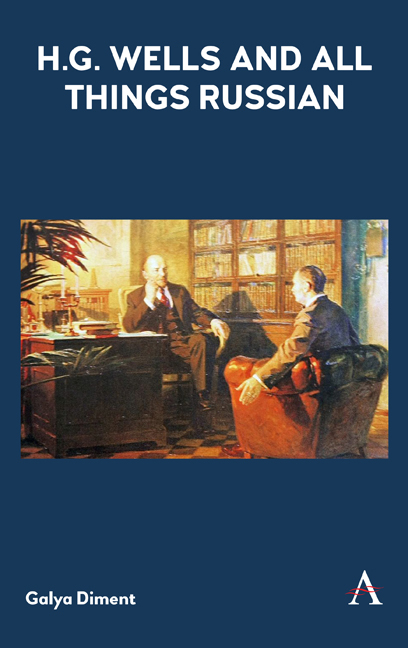Book contents
- Frontmatter
- Dedication
- Contents
- List of Illustrations
- Acknowledgments
- List of Contributors
- A Note on Transliteration
- Introduction: “The Wells Effect”
- Part One WELLS IN RUSSIA: PRE-WORLD WAR II
- Chapter One Yevgeny Zamyatin and the Wellsian Utopia
- Chapter Two Time Machines and Metamorphoses: H. G. Wells's Influence on Mikhail Bulgakov and Sigizmund Krzhizhanovsky
- Chapter Three “The Wellsian Twist” in Nabokov's “Terra Incognita”
- Part Two WELLS IN RUSSIA: POST-WORLD WAR II
- Part Three RUSSIA IN WELLS
- APPENDIX TRANSLATIONS
- Bibliography
- Wells, Herbert George – Works Index
- General Index
Chapter Two - Time Machines and Metamorphoses: H. G. Wells's Influence on Mikhail Bulgakov and Sigizmund Krzhizhanovsky
from Part One - WELLS IN RUSSIA: PRE-WORLD WAR II
Published online by Cambridge University Press: 06 September 2019
- Frontmatter
- Dedication
- Contents
- List of Illustrations
- Acknowledgments
- List of Contributors
- A Note on Transliteration
- Introduction: “The Wells Effect”
- Part One WELLS IN RUSSIA: PRE-WORLD WAR II
- Chapter One Yevgeny Zamyatin and the Wellsian Utopia
- Chapter Two Time Machines and Metamorphoses: H. G. Wells's Influence on Mikhail Bulgakov and Sigizmund Krzhizhanovsky
- Chapter Three “The Wellsian Twist” in Nabokov's “Terra Incognita”
- Part Two WELLS IN RUSSIA: POST-WORLD WAR II
- Part Three RUSSIA IN WELLS
- APPENDIX TRANSLATIONS
- Bibliography
- Wells, Herbert George – Works Index
- General Index
Summary
During the first two decades of the Soviet era, many innovative younger writers – including Mikhail Bulgakov, Yury Olesha, Yevgeny Zamyatin, A. N. Tolstoy and the members of the Serapion Brothers circle – benefited from the short-lived confluence of utopian politics and literary radicalism in Russian culture to experiment with science fiction themes. H. G. Wells was an inescapable influence, inspiring some of their most radical fantasies and pungent social critiques. His major science fiction novels, written between 1895 and 1906, were widely available in Russian translation from 1899. After the Bolsheviks came to power, both Wells's speculative fiction and his social novels were even more intensely translated, reprinted and debated. This chapter will examine responses to Wells by two writers, Mikhail Bulgakov (1891– 1940) and his near-exact contemporary, Sigizmund Krzhizhanovsky (1887– 1950). Both men wrote primarily in the genre of fantastic realism, a term which (like their prose) bridges magical realism and speculative fiction. Like Wells's plots, their narratives transpire in a recognizably current, even mundane world; and their fantastic scenarios explore contemporary political, social or scientific discourses. But unlike Wells's fiction – at least his early, widely emulated novels – both Bulgakov and Krzhizhanovsky satirize, and often reject outright, the possibility of utopia. This essay will study their adaptations of two recognizably Wellsian tropes of speculative fiction: first, time travel, as depicted in The Time Machine (1895); and second, metamorphosis, which features in both The Food of the Gods (1904) and The Island of Doctor Moreau (1896). I have slightly privileged Krzhizhanovsky's prose, as Bulgakov's intertextuality with Wells has been explored by other scholars (Cockrell; Rydel). I aim to show how Bulgakov and Krzhizhanovsky used Wells-inspired fantastic plots as a basis for allegories, satires or critiques (and sometimes all three) of contemporary Soviet society.
Both these writers, who moved in the same Moscow literary circles without ever becoming more than acquaintances, were born and educated in Kiev. After the 1917 Revolution, they moved to Moscow, enduring privation and poverty as they struggled to carve out literary careers. Both were frustrated, to varying degrees, by the Soviet regime.
- Type
- Chapter
- Information
- H. G. Wells and All Things Russian , pp. 31 - 50Publisher: Anthem PressPrint publication year: 2019

